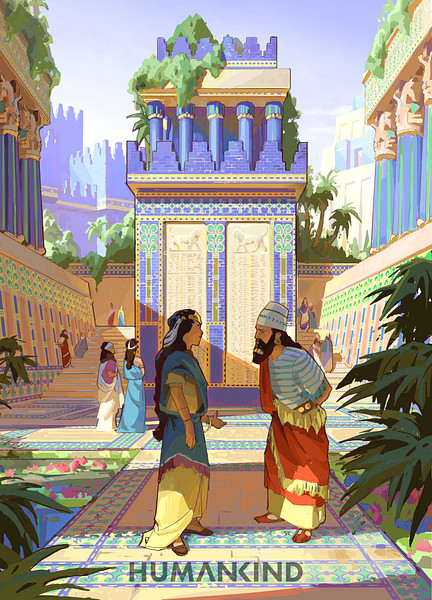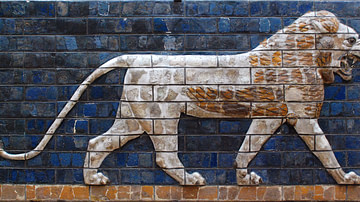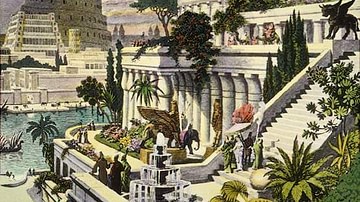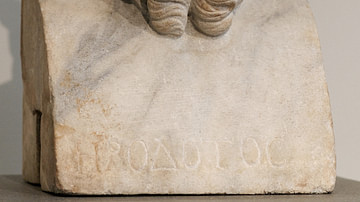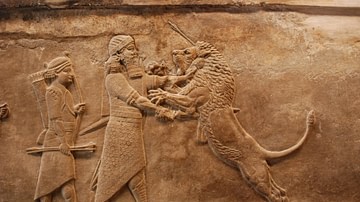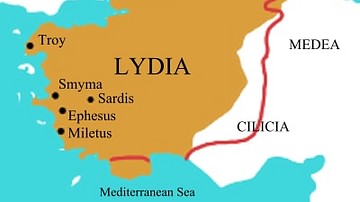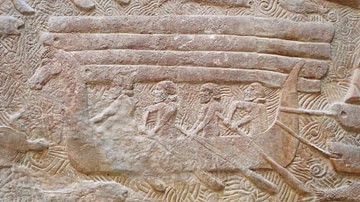The description of Babylon and Babylonian customs in Histories by the Greek historian Herodotus (l. c. 484-425/413 BCE) has long been challenged for accuracy and been found wanting, leading some scholars to dismiss the work entirely as more fiction than fact. This rejection of the Histories, however, derives from applying modern-day historical standards to an ancient historian and, ultimately, is unfair and unprofitable.
Herodotus was a great storyteller who, in keeping with the practice of his time, was as interested in relating a compelling tale as sticking to factual details. It seems increasingly clear, based on archaeological evidence and ancient cuneiform records, that the Babylon of Herodotus’ Histories differs from the actual ancient city of his time, but this is not to say his description is wholly inaccurate nor does it seem reasonable, based on the Babylon passages primarily, to dismiss the whole of his work.
Herodotus & Ancient History
Every ancient historian can be accused of some form of exaggeration or inaccuracy, but few seem to receive the kind of harsh criticism regularly aimed at Herodotus. Diodorus Siculus (l. 90-30 BCE), for example, gives a lengthy description of the life of Queen Semiramis which is understood as almost wholly myth, but the bulk of his work is still accepted as more or less accurate. Statements which cannot be supported by other texts or archaeological evidence certainly should be challenged but it is a mistake to read the works of ancient historians in the light of modern-day historical standards.
A story about the past, to an ancient audience, revolved around a truth, not necessarily the truth. The Egyptian scribes of the Middle Kingdom (2040-1782 BCE) who wrote of the First Intermediate Period (2181-2040 BCE) as a dark time of chaos were purposefully exaggerating the problems of the past to highlight the stability of their present. Archaeological evidence has clearly shown the First Intermediate Period was not the tumultuous era the ancient scribes present but their narratives do correspond to a time of instability, change, and uncertainty.
This same paradigm is seen in Mesopotamian Naru Literature in which some historical figure such as Sargon of Akkad (r. 2334-2279 BCE) or Naram-Sin (r. 2261-2224 BCE) is featured in what amounts to a fictional tale. The facts may not correspond to what modern-day scholars understand as history but, to an ancient audience, would have communicated some important cultural or religious truth.
In this same way, Herodotus relates the grandeur of Babylon and the strange or disturbing (to him) customs of the people. It does not seem that Herodotus ever visited Babylon himself and was relying on second-hand information from which, as a storyteller, he wove one of the most compelling narratives of the city extant. This description does not correspond to the ruins excavated in the modern age or ancient Mesopotamian records but does provide insight into how a Greek writer of the 5th century BCE viewed the culture of the Near East.
His Babylonian narrative is criticized at a number of points in the modern day, including I:178 (the description of the city) and I:189-I:191 on the fall of Babylon to Cyrus II (the Great, r. c. 550-530 BCE), but those who find fault with Herodotus’ work overall usually focus on I:192-I:200 and, especially, I:199 in which he discusses “sacred prostitution”. There is no evidence of any such practice as he describes it in the Near East, much less at Babylon, and so this passage has encouraged some modern scholars to reject the entirety of the work. As scholars W.F.M. Henkelman et. al. point out, however:
What Herodotus’ work is not, is a scholarly description of the twenty-first century kind, which can be simply read as history. It is, instead, a literary masterpiece, which betrays far more of the Greek image of matters than about such matters themselves. (465)
It seems reasonable to consider this approach to Herodotus’ work and appreciate it for what it has to offer rather than reject it completely on the basis of a few chapters or, in some cases, simply on I:199.
The Text
The following text is taken from The Landmark Herodotus: The Histories, edited by Robert B. Strassler:
I:192. As to the resources of the Babylonians how great they are, I shall show by many other proofs and among them also by this: For the support of the great king and his army, apart from the regular tribute the whole land of which he is ruler has been distributed into portions. Now whereas twelve months go to make up the year, for four of these he has his support from the territory of Babylon, and for the remaining eight months from the whole of the rest of Asia; thus the Assyrian land is in regard to resources the third part of all Asia: and the government, or satrapy as it is called by the Persians, of this territory is of all the governments by far the best; seeing that when Tritantaichmes son of Artabazos had this province from the king, there came in to him every day an artab full of silver coin (now the artab is a Persian measure and holds more than the medimnos of Attica by three Attic choinikes); and of horses he had in this province as his private property, apart from the horses for use in war, eight hundred stallions and sixteen thousand mares, for each of these stallions served twenty mares: of Indian hounds moreover such a vast number were kept that four large villages in the plain, being free from other contributions, had been appointed to provide food for the hounds.
I:193. Such was the wealth which belonged to the ruler of Babylon. Now the land of the Assyrians has but little rain; and this little gives nourishment to the root of the corn, but the crop is ripened and the ear comes on by the help of watering from the river, not as in Egypt by the coming up of the river itself over the fields, but the crop is watered by hand or with swing-buckets. For the whole Babylonian territory like the Egyptian is cut up into channels, and the largest of the channels is navigable for ships and runs in the direction of the sunrising in winter from the Euphrates to another river, namely the Tigris, along the bank of which lay the city of Nineveh. This territory is of all that we know the best by far for producing corn: as to trees, it does not even attempt to bear them, either fig or vine or olive, but for producing corn it is so good that it returns as much as two-hundred-fold for the average, and when it bears at its best it produces three-hundred-fold. The leaves of the wheat and barley there grow to be full four fingers broad; and from millet and sesame seed how large a tree grows, I know myself but shall not record, being well aware that even what has already been said relating to the crops produced has been enough to cause disbelief in those who have not visited the Babylonian land. They use no oil of olives, but only that which they make of sesame seed; and they have date-palms growing over all the plain, most of them fruit-bearing, of which they make both solid food and wine and honey; and to these they attend in the same manner as to fig-trees, and in particular they take the fruit of those palms which the Hellenes call male-palms, and tie them upon the date-bearing palms, so that their gall-fly may enter into the date and ripen it and that the fruit of the palm may not fall off: for the male-palm produces gall-flies in its fruit just as the wild-fig does.
I:194. But the greatest marvel of all the things in the land after the city itself, to my mind is this which I am about to tell: Their boats, those I mean which go down the river to Babylon, are round and all of leather: for they make ribs for them of willow which they cut in the land of the Armenians who dwell above the Assyrians, and round these they stretch hides which serve as a covering outside by way of hull, not making broad the stern nor gathering in the prow to a point, but making the boats round like a shield: and after that they stow the whole boat with straw and suffer it to be carried down the stream full of cargo; and for the most part these boats bring down casks of palm-wood filled with wine. The boat is kept straight by two steering-oars and two men standing upright, and the man inside pulls his oar while the man outside pushes. These vessels are made both of very large size and also smaller, the largest of them having a burden of as much as five thousand talents' weight; and in each one there is a live ass, and in those of larger size several. So when they have arrived at Babylon in their voyage and have disposed of their cargo, they sell by auction the ribs of the boat and all the straw, but they pack the hides upon their asses and drive them off to Armenia: for up the stream of the river it is not possible by any means to sail, owing to the swiftness of the current; and for this reason they make their boats not of timber but of hides. Then when they have come back to the land of the Armenians, driving their asses with them, they make other boats in the same manner.
I:195. Such are their boats; and the following is the manner of dress which they use, namely a linen tunic reaching to the feet, and over this they put on another of wool, and then a white mantle thrown round, while they have shoes of a native fashion rather like the Boeotian slippers. They wear their hair long and bind their heads round with fillets, and they are anointed over the whole of their body with perfumes. Each man has a seal and a staff carved by hand, and on each staff is carved either an apple or a rose or a lily or an eagle or some other device, for it is not their custom to have a staff without a device upon it.
I:196. Such is the equipment of their bodies: and the customs which are established among them are as follows, the wisest in our opinion being this, which I am informed that the Enetoi in Illyria also have. In every village once in each year it was done as follows: When the maidens grew to the age for marriage, they gathered these all together and brought them in a body to one place, and round them stood a company of men: and the crier caused each one severally to stand up, and proceeded to sell them, first the most comely of all, and afterwards, when she had been sold and had fetched a large sum of money, he would put up another who was the most comely after her: and they were sold for marriage. Now all the wealthy men of the Babylonians who were ready to marry vied with one another in bidding for the most beautiful maidens; those however of the common sort who were ready to marry did not require a fine form, but they would accept money together with less comely maidens. For when the crier had made an end of selling the most comely of the maidens, then he would cause to stand up that one who was least shapely, or any one of them who might be crippled in any way, and he would make proclamation of her, asking who was willing for least gold to have her in marriage, until she was assigned to him who was willing to accept least: and the gold would be got from the sale of the comely maidens, and so those of beautiful form provided dowries for those which were unshapely or crippled; but to give in marriage one's own daughter to whomsoever each man would, was not allowed, nor to carry off the maiden after buying her without a surety; for it was necessary for the man to provide sureties that he would marry her, before he took her away; and if they did not agree well together, the law was laid down that he should pay back the money. It was allowed also for any one who wished it to come from another village and buy. This then was their most honourable custom; it does not however still exist at the present time, but they have found out of late another way, in order that the men may not ill-treat them or take them to another city: for since the time when being conquered they were oppressed and ruined, each one of the common people when he is in want of livelihood prostitutes his female children.
I:197. Next in wisdom to that, is this other custom which was established among them: They bear out the sick into the market-place; for of physicians they make no use. So people come up to the sick man and give advice about his disease, if any one himself has ever suffered anything like that which the sick man has, or saw any other who had suffered it; and coming near they advise and recommend those means by which they themselves got rid of a like disease or seen some other get rid of it: and to pass by the sick man in silence is not permitted to them, nor until one has asked what disease he has.
I:198. They bury their dead in honey, and their modes of lamentation are similar to those used in Egypt. And whenever a Babylonian man has intercourse with his wife, he sits by incense offered, and his wife does the same on the other side, and when it is morning, they wash themselves, both of them, for they will touch no vessel until they have washed themselves: and the Arabians do likewise in this matter.I:199. Now the most shameful of the customs of the Babylonians is as follows: Every woman of the country must sit down in the precincts of Aphrodite once in her life and have commerce with a man who is a stranger: and many women who do not deign to mingle with the rest, because they are made arrogant by wealth, drive to the temple with pairs of horses in covered carriages, and so take their place, and a large number of attendants follow after them; but the greater number do thus,—in the sacred enclosure of Aphrodite sit great numbers of women with a wreath of cord about their heads; some come and others go; and there are passages in straight lines going between the women in every direction, through which the strangers pass by and make their choice. Here when a woman takes her seat she does not depart again to her house until one of the strangers has thrown a silver coin into her lap and has had commerce with her outside the temple, and after throwing it he must say these words only: "I demand thee in the name of the goddess Mylitta": now Mylitta is the name given by the Assyrians to Aphrodite: and the silver coin may be of any value; whatever it is she will not refuse it, for that is not lawful for her, seeing that this coin is made sacred by the act: and she follows the man who has first thrown and does not reject any: and after that she departs to her house, having acquitted herself of her duty to the goddess, nor will you be able thenceforth to give any gift so great as to win her. So then as many as have attained to beauty and stature are speedily released, but those of them who are unshapely remain there much time, not being able to fulfil the law; for some of them remain even as much as three or four years: and in some parts of Cyprus too there is a custom similar to this.
I:200. These customs then are established among the Babylonians: and there are of them three tribes which eat nothing but fish only: and when they have caught them and dried them in the sun they do thus,—they throw them into brine, and then pound them with pestles and strain them through muslin; and they have them for food either kneaded into a soft cake, or baked like bread, according to their liking.
Conclusion
Herodotus has been proven wrong regarding his claims on sacred prostitution and, in fact, I:199 has encouraged the image of Babylon as a city of sexual licentiousness rather than a more accurate picture of it as a great cultural, religious, and trade center. He is also mistaken in his claim in I:197 that there were no doctors in Babylon as medical practice in ancient Mesopotamia is well-established. Even so, asking why Herodotus makes these claims and what that says about ancient history writers and the concept of ancient history itself is more profitable than rejecting a work because it does not accord with the standards of modern historical research and presentation.
